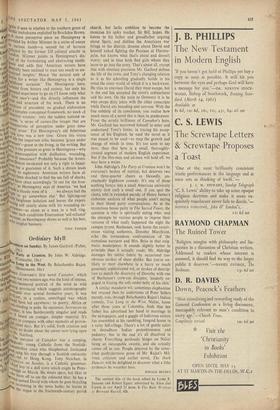Ordinary Idyll
_..s"etIteen on Sunday. By James Gafford. (Faber, r ks-onstable, 18s.) erSt°" (Heinemann. 16s.) , a ..,1,:1!S GAREORD'S first novel Camphor, which ,,d parti"lie Out two winters ago, was the kind of intense, -.jest i'l.no di-thannered portrait of the artist as wild LIC clOy ung provincial which suggests autobiography gaped ped over several formative years, It was , it ceo',";'ant, in a restless, centrifugal way which (C Kt led anywhere: to poetry, Africa or
1,S,,, , mg in pubs. Its successor, Seventeen on
liallS 4 1"(0, is less flamboyantly singular and reads s if based 114 4,,,.,,ier to sceodm on r eyounger, wi th oth other m em 0 imaterial.rs of pr 0 viitn's. 01 he "al sal it's A' ■ ], ad days. But it s solid, fresh creation and 3ito ' 'aves n to " 0 doubt about the career now lying open .q, r. Gafford. jets 1 tilaule narrator of Camphor was a ramping, 1 6".1,ihi3s°dic young Catholic from the Norfolk- )0-011;444"deolifshire coast who blasphemed, fornicated 1 sling his way through a Scottish university ficie and II fool,i,vortftut to Hong Kong. Tony Strachan, in ,L, cen on Sunday, is a Catholic grammar- l 5 ,■,1 boy in a dull town which might be Peter- , h ,.,..„01 °ough or M ''' tak.., r arch. He wears specs, but likes to "*Ejec_ them off to see the coloured blur; he has a in," named David with whom he goes bicycling 1,," SWimming in the town baths; he learns to ''Y the organ in the fourteenth-century parish church, but lacks ambition to become the musician his spiky teacher, Sir Bill, hopes. He listens to his father and grandfather arguing about Spain, and dislikes the Americans war brings to the district; dreams about David and himself naked fighting the Persians at Thermo- pylae, but knows what that's about and doesn't worry; and in time both find girls whom they leave to go into the army. That's about all, except that with absolute precision Mr. Garford defines the life of the town, and Tony's changing relation to it as his schooling gradually builds in his mind the outer world of which it is a backwater. He tries to convince David they must escape, but 'n the end has accepted the town's ordinariness and his own. On the train to Oswestry it is he who swops dirty jokes with the other conscripts while David sits brooding and nervous. With the fine subtlety of its conclusion, you realise how much more of a novel this is than its predecessor. From the erratic brilliance of Camphor's hero, Mr. Garford has narrowed himself to enter and understand Tony's limits; in tracing his accep- tance of his England, he used the novel as it was meant to be used—to map the growth and change of minds in time. It's too soon to say more than that here is a small, thoroughly- created segment of modern English experience. Rut if the, film-men and ad-men will hold off, we may have a writer.
John Aldridge's The Party at Cranton won't be everyone's beaker of martini, but deserves two and three-quarter cheers as blessedly, un- abashedly highbrow comedy. It's one of those scathing forays into a small American university society (not such a small one, if you spot the clues), told in extended parody of Henry James's elaborate analysis of what people aren't saying in their bland party conversations. As at the mysterious house party in The Sacred Fount, the question is who is spiritually eating who; and the attempts by various people to impose their versions of what really happened the night the campus tyrant, Buchanan, took home the carniv- orous visiting authoress, Dorothy Murchison, echo the tremendous confrontation of the tremulous narrator and Mrs. Briss in that enig- matic masterpiece. It sounds slightly better in principle than it actually reads; Mr. Aldridge damages his satiric fabric by occasional too- obvious strokes of sheer dislike. But you're un- likely to meet elsewhere in a hurry so much genuinely sophisticated wit, or strokes of descrip- tion to match the discovery of Dorothy with one of Buchanan's crew-cut disciples, 'tenderly en- gaged in kissing the soft under-belly of his chin.'
A similar mandarin wit, sometimes elephantine but rescued then by undertones of Peter Sellers parody, runs through Balachandra Rajan's Indian
comedy, Too Long in the West. Nalini, home after three years at- Columbia, finds that her
father has advertised her hand in marriage in the newspapers, and a gaggle of ludicrous suitors has assembled at his rambling, fungoid house in a rainy hill-village. There's a lot of gentle satire on threadbare Indian pretentiousness and pedantry, but in the end it's all dissolved in charm. Everything perilously hinges on Nalini being an inescapable sweetie, and she actually conies off as one. People deterred by the some- what pachydermous prose of Mr. Rajan's Mil- tonic criticism and earlier novel, The Dark Dancer, will be delighted to discover what a lithe proboscis he wreathes here.
RONALD DRYDEN
The omitted title of the book edited by Lester E. Denonn and Robert Egner, advertised by Allen and Unwin in our April 21 issue, is The Basic IVritinqs of Bertrand Russell, 42s.






































 Previous page
Previous page